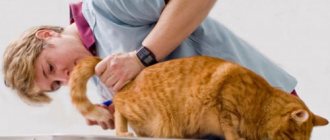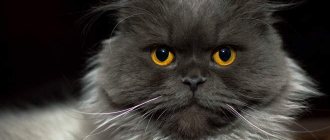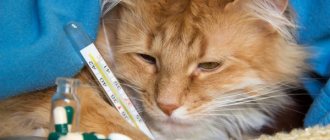Hypersalivation in cats is excessive production of saliva, which occurs for various reasons. This symptom causes concern and fear for the pet’s health. Owners should seek veterinary help with this problem. Indeed, in some cases, hypersalivation in cats is a sign of serious health problems.
What is hypersalivation
This phenomenon does not always indicate serious problems. Increased salivation can be caused by natural causes. But it is worth monitoring your pet’s well-being until the symptom disappears. Otherwise, you may miss the onset of some diseases.
The symptom does not always manifest itself quite clearly; in this case, hypersalivation is detected by a number of indirect signs:
- wet fur on the neck, chest, chin;
- the cat washes itself frequently;
- the pet sticks out its tongue;
- wet spots on the bed or places where the cat spends a lot of time;
- often rubs against various objects.
Saliva may flow from the mouth in small droplets, and sometimes even in streams in the form of a clear liquid or even foam. If your behavior or habits change, you should immediately contact a veterinarian.
Should I worry?
Increased salivation is a deviation from a physiological point of view, and in almost all cases it has a specific cause that needs to be found.
Hypersalivation is not always provoked by pathology, and in this case a visit to the veterinarian will not be necessary. The reaction may be self-limiting. On the other hand, it can be caused by a complex illness that will affect not only the health of the pet, but also all other family members.
The causes of hypersalivation are divided into two groups. The first includes non-dangerous ones, while the second includes complex pathologies that require urgent treatment, which must be treated exclusively with the help of a veterinarian.
Types of hypersalivation
There are two types of drooling - normal and pathological. The first condition is a non-hazardous phenomenon caused by physiological characteristics. The second, on the contrary, is caused by diseases, including fatal ones.
Regular
The animal can thus show its owner its affectionate attitude. When stroked, the cat purrs, and saliva begins to leak from the pet's mouth. This situation especially often occurs with sphinxes and other breeds that have an elongated muzzle.
Foreign objects stuck in teeth, gums, and soft tissues can cause hypersalivation. This is revealed during examination of the oral cavity. The pet will make every effort to cope with this problem, but sometimes it cannot solve such a problem on its own.
Cats are distinguished by their curiosity, which nature has generously endowed them with. They may eat an insect or plant even if it is poisonous or tastes bad. This can also cause drooling. If the condition is accompanied by diarrhea and vomiting, you must contact a veterinary clinic as soon as possible.
Question to the expert
Is it true that cats sense dangerous or poisonous food?
Cats' ability to sense or taste poisonous plants or inedible food has been greatly exaggerated. It is worth keeping potentially dangerous flowers, chemicals and even spoiled food away from your pet - cats are attracted to strong pungent odors, and besides, their curiosity can play a cruel joke.
Another reason for natural hypersalivation is motion sickness of the animal. Sometimes, during a long trip, the cat may also suffer from this problem, which manifests itself in increased salivation, which will disappear after the end of the trip.
Pathological
This condition requires prompt veterinary intervention. It manifests itself in a number of ways:
- hypersalivation occurs regardless of external factors, as with normal salivation;
- the volume of saliva is constantly increasing;
- bouts of salivation last more than two hours;
- there are other symptoms of diseases.
If there are one or more factors, it is important to seek veterinarian advice as soon as you can.
Normal salivation
Saliva is a necessary agent for performing vital functions: liquefying hard lumps of food, disinfecting food, and ensuring the best digestibility of foods. In some natural processes, copious secretion of salivary fluid is normal:
- When you see food or smell appetizing smells.
- Before eating.
- In the process of absorbing food, especially dry food.
- In a stressful situation.
- After consuming unpleasant-tasting or caustic medications, such as anthelmintics.
It is normal to have some excess salivary fluid around the pet's mouth and on the fur. If saliva is released in large volumes over a significant period of time, this should cause concern to the owner and prompt him to seek medical help.
The normal flow of saliva is called “salivation.” The process of excessive secretion of natural fluids from the oral cavity is called “hypersalivation.”
Causes of hypersalivation in cats
This phenomenon is caused by a number of reasons that can be classified into three separate groups - physiological, psychological and contagious.
The first group includes:
- Cat's reaction to new food. The smell of food enhances salivation by the glands that are located in the animal's mouth.
- Replacing old teeth with new ones. This may be accompanied by inflammation of the gums, pain, drooling, and sometimes bad breath.
- Females are in heat.
- Taking certain medications. This phenomenon can be caused by some anthelmintic drugs or those that have a bitter taste that is unpleasant for the animal.
These cases are due to natural causes rather than health problems or threats. In this case, you should not contact a veterinarian.
For rabies
This is the most dangerous reason, because animal mortality in this case occurs in 100% of cases of infection. Rabies is a viral disease that affects the central nervous system of pets. Infection occurs when contaminated saliva or blood enters the animal's body.
In the early stages, the cat changes in its behavior, it becomes aggressive or too affectionate. Saliva constantly flows from the mouth in the form of viscous white foam. Then the cat experiences muscle paralysis, which prevents it from even taking a sip of water.
The only thing the owner can do is carry out timely prevention in the form of mandatory annual vaccination.
Trichobezoar
When licking, hairs from the cat's fur enter the cat's digestive system. They form into lumps, which are eliminated from the body naturally. Large bezoars are dangerous and can only be removed surgically. They can also cause drooling.
Poisoning
The cat's body reacts to intoxication by salivating. This can happen by eating houseplants, ingesting human medications, or if the pet decides to try cleaning products, etc. Associated symptoms are:
- diarrhea;
- lethargy;
- abdominal pain;
- dilated pupils;
- convulsions.
In this case, the cat must be taken to the veterinarian as soon as possible to provide assistance.
Oral diseases
It is important to carefully examine the oral cavity to make sure there is no unpleasant odor. Saliva often flows with stomatitis and gingivitis. The mucous membrane is red, emits an unpleasant odor, and the cat refuses food. These diseases can cause tooth loss if the necessary measures are not taken in time.
Infectious diseases
Such diseases are calcivirosis or rhinotracheitis. They are also accompanied by frequent sneezing, fever, discharge from the eyes and nose, and erosions and ulcers appear in the oral cavity.
Allergic reactions
This could be a food intolerance, a reaction to medication, or if the cat ate something she shouldn't have, such as plants from pots on the windowsill.
Helminthiasis
Ptyalism or hypersalivation can be a consequence of a cat being infected with helminths. In this case, it is necessary to carry out treatment against parasites according to the advice of a veterinarian.
Gastrointestinal diseases
Excessive salivation may indicate chronic diseases of the digestive system. This can be recognized by other manifestations:
- inflammation or neoplasm of the esophagus;
- stomach or intestinal ulcer;
- chronic gastritis;
- hernias
If pathological processes occur in the esophagus, difficulties appear with swallowing food, and the cat may completely refuse to eat due to pain. Some of these problems can be solved exclusively by surgery (for example, hernias).
Oncology
Neoplasms in the oral cavity and digestive system (stomach, esophagus) are also causes of increased ptyalism.
Question to the expert
Can increased salivation be caused by an infection?
There are other pathological reasons that cause a cat to drool. These are contagious and non-contagious diseases. Hypersalivation may be accompanied by damage to the nervous system, which is observed during the development of infections.
Motion sickness of an animal
A cat, just like a person, can get motion sickness while driving a car. If the pet owner may feel nauseous or dizzy, the pet may experience loss of appetite and drooling. This is not a particular problem; as soon as the animal is delivered to its destination, hypersalivation will go away on its own, without human intervention.
Veterinary pharmacies sell special medications that will reduce psychological stress in the animal and also reduce salivation. You should not give human medications for motion sickness, as this can be extremely dangerous to the health of the animal.
Showing affection to the owner
A cat may drool when interacting with its beloved owner, especially after a long separation, for example, after a day of work when the person returns home. This is how furry pets “fall into childhood”, showing affection to the owner, like little kittens to their mother cat.
Psychological reasons
Psychological causes of hypersalivation are:
- Nervousness of the cat. The animal begins to lick itself vigorously when it experiences nervous overload, which contributes to excessive salivation.
- Riding in transport. The cat experiences stress, motion sickness, discomfort, and fear.
- Communication with children. It has been observed that cats that spend a lot of time with children often have a higher degree of drooling.
If possible, the cat needs to create comfortable, safe living conditions and eliminate stressful situations.
Gums and teeth
With age or poor care, your cat's teeth wear out and her gums become inflamed. Some oral problems arise as a result of an underlying chronic disease
If a cat drools, chews with caution, and does not allow its head to be touched, it may be suffering from constant pain caused by caries, gingivitis, or another ailment.
In addition, the cat could pierce its gum with a fish bone, and a piece of food could get stuck between its teeth. Sometimes, while playing, cats will scratch the roof of their mouth and the insides of their cheeks with sharp “toys” found behind the sofa. Often, increased salivation in a cat indicates discomfort in the oral cavity, so you should carefully, without rudeness or coercion, examine the tongue, teeth, gums, palate and inner sides of the cheeks for foreign bodies, scratches and microcracks, ulcers and inflammation.
Treatment methods
Ptyalism caused by physiological or psychological reasons goes away on its own. Treatment in such situations is not required. After overload, it is important to give the animal a rest and relaxation. It is worth conducting a thorough examination of your pet, especially paying attention to the mouth and mucous membranes. You need to make sure that there are no stuck foreign objects.
If found, the object must be removed with tweezers, then the wound must be washed and treated with Miramistin or another suitable antiseptic.
.If this is caused by pathological reasons, it is important to contact a veterinary clinic. After being examined by a doctor and establishing an accurate diagnosis, the specialist prescribes appropriate treatment. If necessary, blood can be taken, ultrasound performed and other research methods used.
If parasites are detected in the body, anthelmintic medications are prescribed; for diseases of the digestive system, the main treatment is diet. Oral problems can be solved with ointments and drops. If necessary, the veterinarian performs surgery.
If rabies is diagnosed, the animal, unfortunately, must be euthanized. Cat owners will have to take preventive measures to prevent infection.
Gums and teeth
With age or poor care, your cat's teeth wear out and her gums become inflamed. Some oral problems arise as a result of an underlying chronic disease
If your cat drools, chews with caution, and does not allow its head to be touched, it may be suffering from constant pain caused by
Attentive pet owners always notice when something is wrong with their pets. One of the signs that may cause concern to a cat owner is excessive salivation. What reasons can cause excessive salivation, and are they all associated with the development of any pathology?
Prevention measures
To avoid excessive drooling due to pathological problems, there are some preventive measures:
- comply with mandatory vaccination requirements;
- minimize the possibility of contact between a pet and street animals;
- maintain a proper balanced diet;
- ensure the freshness of your cat’s food;
- regularly examine your pet; if unusual manifestations are detected on the skin or mucous membranes, you should seek help from a veterinarian;
- block the cat’s access to poisonous plants, medicines, and household chemicals;
- Brush the coat regularly; for fluffy breeds, use a furminator.
To prevent the formation of bezoars, there is a special paste that should be given to your pet periodically with food. It facilitates the removal of hair from the digestive tract.
All measures to prevent hypersalivation are quite simple. They do not require much effort or financial costs, but help to avoid serious health problems for your pet, and therefore prolong its life.
Unusual symptoms
In addition to increased salivation, the cat also develops other symptoms:
- she cranes her neck;
- makes frequent swallowing movements;
- coughs;
- refuses to eat;
- behaves restlessly.
In such cases, it is necessary to urgently take the sick animal to a veterinary clinic to take an x-ray and quickly remove the foreign body. A special endoscope is used for this procedure. If you start helping the animal yourself and remove an object from the esophagus without special equipment, you can cause serious injury to the cat.
When the cat's tongue is on its side and drooling is very strong, then you also need to visit a doctor. This could be either ordinary food poisoning or an allergy to some product. Thus, qualified assistance will be required in any case. Contact our veterinary clinic as soon as possible if the question “why is the cat drooling” begins to torment you.
Injury
Trauma to the mouth can cause excessive drooling. Oral injuries can occur if a cat bites through an electrical cord and suffers a burn to the mouth. If your cat has recently gotten into a fight with another cat, any trauma to the mouth, such as a broken jaw, may cause drooling.
Keeping a cat indoors reduces the chance of injury from being hit by a car or attacked by a rival cat for territory. An injury to a dislocated temporomandibular joint or a fractured jaw can lead to excessive drooling due to the cat's inability to close its mouth.
If you suspect your cat is drooling due to an oral injury, a thorough oral examination and x-rays may be required to make an accurate medical diagnosis.










